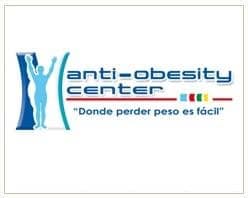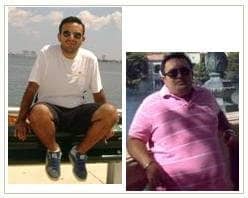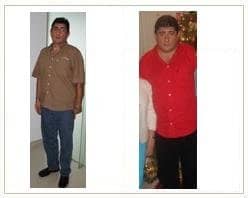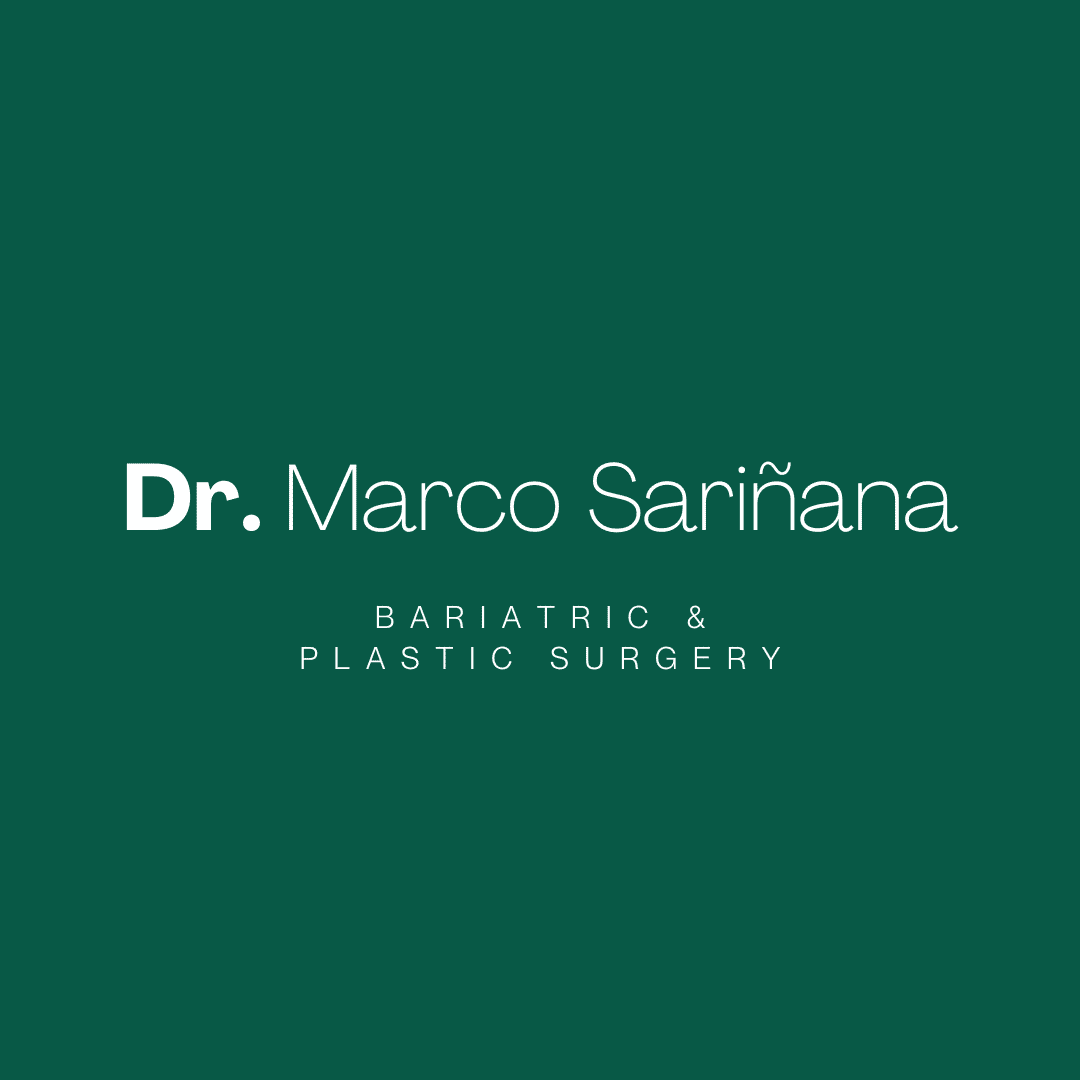Request a video call
Confirm Your Virtual Consultation
Antiobesity Center Profile Overview
In the first half of the 21st century, an alarming number of individuals around the world have been diagnosed as either overweight or obese. As it is well known that obesity and weight gain is caused by a multitude of factors, including metabolism, body composition, genetics and overall medical condition, facilities today are taking a more well rounded approach to treating obesity. To achieve true weight loss and to lose weight effectively and safely, a whole-body approach is necessary.
The Antiobesity Center, located in Cancun, Mexico is a state-of-the-art clinic treating obesity through weight loss therapies, weight management techniques and weight loss surgical procedures. Taking a multidimensional approach to treatment of obesity, staff at the Antiobesity Center consider cultural, social, metabolic, and physiological aspects that lead to weight gain and obesity.
Obesity is caused by a multitude of factors, including individual rate of metabolism, psychology (comfort-food eating, stress), genetics, sedentary lifestyles, and some medications. Utilizing all aspects of the potential causes and reasons for an individual's weight gain or obesity before initiating treatment is a key factor in long-term success.
Treatments
Treatments offered at the Antiobesity Center include:
-
Restrictive and malabsorption of bariatric obesity surgery procedures, defined as
* Intragastric balloon (BIB® system)
* Gastric sleeve (such as vertical sleeve gastrectomy)
* Adjustable gastric band (banded gastroplasty)
* Mini bypass (may include laparoscopic obesity surgery)
* Gastric bypass (obesity gastric bypass surgery)
* Lapband system® (lap banding)
* Fullsense Bariatric Device® -
Dietary and nutrition education
-
Exercise training
-
Lifestyle changes
The Antiobesity Center utilizes a combination of diet, exercise, and lifestyle changes to help patients achieve weight loss goals and enhance health. The Center takes into consideration a variety of client factors when it comes to obesity treatment including:
-
Patient's weight vs. reasonable weight
-
Dietary history
-
Metabolic or medical complications
-
Body composition
-
Current eating patterns and habits
Weight loss management involves treatment of obesity counseling, weight loss therapies and treatment, exercise, nutrition and diet education and counseling, and support. Discussions and counseling from a bariatric surgeon or weight loss physicians is vital. The Antiobesity Center offers a professional bariatric surgery clinic, experienced leadership, structured exercise, group or individual meetings, prepackaged meals with dietary supplements and weight loss therapies that take behavioral and therapy components into consideration, helping individuals achieve a safe and healthy weight, with the tools necessary for maintaining such weight loss in the future.
Qualifications
Physicians and staff at the Antiobesity Center, a private institution dedicated to the treatment of obesity utilizes the multidisciplinary approach and management to weight loss techniques, procedures and surgeries. Bariatric surgeon, weight loss surgeries and weight loss physicians at the Center are trained in:
-
Gastrointestinal endoscopy
-
Psychology
-
Psychiatry
-
Nutrition
-
Group or individual treatment
-
Dietary counseling
The Antiobesity Center takes a step by step process toward treatment which offers a variety of programs, techniques, or surgical procedures to deal with overweight or obese individuals, from dietary intervention to multiple forms and options for bariatric surgery.
The Antiobesity Center offers the expertise of staff experienced and trained in bariatric surgery, internal medicine, anesthesia, plastic and reconstructive surgeries, psychiatry, psychology, physical medicine and rehabilitation and nutrition. The Center strives to change quality of life, and enhance health. Bariatric surgery and weight loss programs in Cancun offer international patients a multidimensional approach to weight loss and weight loss management.
Local Attractions
The Antiobesity Center is located in Cancun, the ultimate tourist destination for many Americans seeking obesity and weight loss treatments and procedures south of the border. Nestled against the Caribbean, Cancun provides modern and state of the art weight loss and obesity surgery center and surgical facilities that may be accessed via national and International airlines.
International patients from around the world benefit from the expertise and whole body approach that the Antiobesity Center takes toward weight loss management, obesity or bariatric surgical procedures and weight loss treatments. Programs and packages for medical tourists are available, as are financial payment plans and packages for any need.
Please Click here to request more information from Antiobesity Obesity Clinic.
Antiobesity Center, Cancun, Mexico Profile Details
Our center is performing specific activities to offer the patient the best results in the treatment of obesity, when the patient is a candidate for surgery, we offer the most advanced laparoscopic procedures, including diagnosis and treatment of obesity.
Our center has the most modern infrastructure, supported by the best hospitals. The newly created Center Antiobesity been possible thanks to the broad perspective and vision of a group of highly trained doctors bariatria, advanced laparoscopic surgery as well as in gastrointestinal endoscopy, nutrition, psychiatry / psychology, etc.. the best training centers in the world. Have participated in numerous conferences, training centers, and are authors of numerous articles and book chapters worldwide fame.
Within our program is our firm belief that the so-called "minimally invasive surgery" and the surgery combined with minimally invasive endoscopic and offer undoubted advantages for patients and a rapid recovery from surgery compared to a similar procedure performed in an "open" or Traditional.
It is essential for a patient who wishes to control his/her weight to visit a specialized center for obesity treatment such as a bariatric clinic. To be able to successfully achieve a weight control plan supervised by health professionals, it is a major factor to provide experience, knowledge, help and encourage trust and confidence to people who wish to undertake such a weight reduction plan. The goal of the Anti-obesity Center is to offer patients with obesity and overweight problems a warmth, honorable, secure and effective service, characteristics of the Hospital Galenia, as it is the first center specialized in obesity problems in Cancun.
Hospital Galenia Consultorio 305
Av. Tulum L1 M 1 SM 12
Cancun, Quintana Roo, 77504
Directo/Fax: (998) 267-7404
(998) 891-5200 ext: 305
Urgencias 24 hrs: (998) 874-0435
Nextel: 143*18515*2
Cancun Amerimed HospitalAv. Bonampak - Av. Nichupté, Cancun, Quintana Roo.
Located in Plaza Las Américas
Fax: 011-52-998-881-3466
Local in Cancun: 881-3400
Dr. Jorge Treviño
Please Click here to request more information from Antiobesity Obesity Clinic.
Antiobesity Center Treatments Offered
Surgical Treatment of Obesity
Surgical Procedures
The first surgical procedures for obesity dating from the 60's, Mason being the pioneer in gastric resection for reducing the volume of the stomach, this followed by multiple surgeons themselves have been given the task of finding the essential procedure for the treatment of morbid obesity.
During the 1980's with the development of a surgery of minimal invasive surgery known as laparoscopic surgery, these treatments gained great popularity reporting nearly 200,000 procedures a year alone in the United States.
A surgical treatment is necessary in individuals with certain characteristics, generally extremely obese patients with IMC of 40 or more. The surgeon must very strictly choose each patient to undergo surgery, providing a very close social and behavior support before, during and after the surgery. Throughout the past years, "less "aggressive" surgeries have arisen such as the “gastric sleeve” or the mini gastric by-pass. The results are promising but there is still a need for a long-term follow-up to determine their efficiency.
Within the NON SURGICAL procedures the intragastric "balloon" stands out , this consists on placing a silicon balloon through a minor procedure known as an endoscopy and applying a sedation technique, which has outstanding advantages and some disadvantages mainly its temporality of only 6 months
Recently have been developed new techniques such as the esophix and fullsense device that are mainly implanted via endoscopy
We objectively analize results as follow:
Percentage of excess weight loss
- Excellent 100-75%
- Good 74 to 50 %
- Regular 49 to 25%
- Bad 24 to 0%
US National Health Institutes point out three successful index
- 25% or more pre-surgery weight loss
- 50% or more excess weight loss
- 50% ideal weight loss
There is no necessary relationship between the amount of weight loss and the feeling of wellness in an only 10% excess weight loss of the patient who seems satisfied Edward E. Mason points out that a good result is a 25% or more weight loss within the following 5 years, without undergoing any operations. Nowadays, we tend to link the decrease in weight to co morbidity improvement (which means someone suffering two or more illnesses at the same time), with the patients auto evaluation on how he/she feels now compared to his life style prior to the surgery. Generally speaking, it is accepted that surgical interventions for serious obesity have a morbiliidad of less than 2% and a mortality percentage of less than 0.5.
Intra-gástric Balloon BioEnterics® (BIB)It is a system where no surgery is involved nor any pharmacological procedures, it is placed through endoscopy with minimum sedation. The BIB system provokes a temporary loss of weight in obese patients by partially filling the stomach thus helping the patient to feel a sensation of satiety.
It is a method with a minimal risk and more economical than any surgery. When the patient follows indications, he/ she can lose up to 30 kg of weight in one year. The greatest disadvantage is that he/she must change it every 6 months and some patients do not tolerate it. Candidates for this method must be selected very carefully because all through this short period it is very difficult to change their nutritional and exercise habits. Indications:
BIB treatment is suggested under the following terms:
- Patients with slight to moderate obesity, with significant risks for his/her health related to his/her obesity that have failed in controlling and maintaining a weight loss with other supervised methods or programs supervised.
- Severely obese patients (or super obese with an IMC> 50) with high IMC that need temporary weight loss, as preparation for a permanent surgical procedure.
- Obese patient candidates for a surgery who hold a very high risk Candidates for a permanent surgery that reject the surgery as their only alternative
Counter indications
- Big hiatal hernia with symptomatic acid reflux
- Gastric or duodenal ulcer
- Cáncer
- Previous gastric surgery
- Balloon intolerance
- Rejection to multidisciplinary management
- Not following treatment• Believe in miraculous effects
- Pregnancy or wish to do so during treatment
The intragastric balloon is made of high quality silicon, resistant to extreme conditions within the stomach, it is designed to be used as a whole following a nutritionally supervised plan and behavioral management as to modify habits to help patients to control their weight loss as soon as the device is withdrawn, this is the safest way to guarantee the best possible results.
The intra-gastric balloon is introduced in the stomach using the endoscopic method (through mouth), without any incisions, it is deflated and with local anesthesia introduced through the throat and deep sedation is administered by an anesthesiologist. Initially a diagnostic endoscopy (EGD) is done as to determine if or non contraindication appear, if this happens, the procedure is cancelled, the fault is corrected and it is the procedure rescheduled. Once the balloon is introduced, it is filled with a saline solution in a range of approximately 400 to 800 ml. mixed with blue of methylene in order to detect any early breaks during the treatment. The duration of the procedure is around 20 to 30 minutes, being an ambulatory procedure within the great majority of cases. Once filled to its adequate capacity, it is not capable of moving towards the intestine so it will float freely inside the stomach.
The recommended time BIB is 6 months, the use during longer periods is not recommended since the risk of perforation and the potential intestinal obstruction of the patients highly increases.
If it deflates or breaks before due time, you will notice a change of color in the urine, this is because of the dye that was injected as a safety mechanism inside the globe. At this time it is necessary to contact your doctor to schedule as soon as possible the withdrawal.
This technique offers a good possibility of reducing corporal weight, since on an average we have reductions of weight of approximately 15 to 20 kgs. within 5 months. After 6 months the balloon can be deflated and withdrawn using the endoscopy technique without any difficulty. Also by simply filling up the balloon it is possible to continue with the treatment if found necessary
Fullsense Bariatric Device®The Full Sense™ Device is placed via endoscopy in the esophageal / cardiac region of the stomach. It induces satiety by influencing the neurohormonal feedback mechanism. It augments fullness caused by food and simulates fullness in the absence of food. The device is easily removable via endoscopy.
This procedure is orientated towards facilitating the weight lost of a person by placing the silicon band around the stomach, which capacity will diminish up to a 25-30 cc size, he/she will rapidly feel full and thus facilitating the process of losing weight.
The aim is to decrease approximately a 40 % of his/her overweight in a period of 1 to 2 years, with the consequent diminishing of health risks associated to obesity. Besides the feeling of physical and mental wellness, as well as gradually increasing their ability to start an exercise program as well as everyday activities.
ADVANTAGES OF THE ADJUSTABLE GASTRIC BAND THROUGH A LAPAROSCOPIC PROCEDURE
- Includes all the benefits of a laparoscopic surgery
- Less pain
- Less hospital stay
- Minor incisions
- Minor risks of wounds complications
- The stomach and/or the intestine is neither cut nor stapled
- It Is100% reversible
- It adjusts according to the needs of the patients.
- Minimum complications index
- Minimum death rate in comparison to other anti-obesity procedures
- Malnutrition complications are scarce
- Minor risk of nutritional deficiencies
- Small or non hair loss
- There does not exist any syndrome of gastric voidance or Dumping, typical of bypass procedures
- Hospital stay is reduced to less than 48 hours
Lap BandThis procedure consists on placing a silicon band across the stomach through a surgery of minimal invasion (laparoscopic surgery), consisting of small incisions and instruments that form a small gastric reservoir which on receiving the food rapidly fills up with a slow emptying process, and stimulating the early satiety feeling and weight loss.With the advantage of placing it via a laparoscopic surgery, the recovery period of patients is much more rapid by remaining only 24 to 48 hrs in the hospital, and from the aesthetic point of view, avoiding big incisions which in some procedures present complications such as infections, post-operatory hernias, etc. that may result in a need of a second surgery to correct the problems.
Gastric Sleeve
The sleeve gastrectomy or Gastric Sleeve is a relatively new procedure, consisting of cutting with laparoscopic technique approximately 60 % of the stomach and thus considerably decreasing its capacity By cutting two thirds of the stomach, the patient will have a sensation of satiety with little food. Weight loss is estimated in about 12 to 18 months. Another advantage of this procedure is that if the patient, within this period of time, did not lose any of the desired weight, can be complemented with a classic bypass surgery involving better health conditions of the patient, less weight and minor trans and post-operation risks
It is usually practiced through a laparoscopic procedure, using linear titanium staplers and the line of clamps is reinforced with sutures, verifying its impermeability through endoscopic procedures. In such cases the patient remains in the hospital for two or three days before his/her release and after the impermeability and tolerance to liquids of the patient are corroborated. The physiological functions of this procedure, which is also a restrictive procedure (decreases the gastric volume), considerably decreases the restrictive hormone of the appetite (the ghrelina) reducing the need for food.
We can enumerate the advantages over other procedures as follows:
Laparoscopic procedure
- We do not alter the stomach’s physiology
- Procedure that can take place on patients with an IMC moderate to high.
- The best physiologically possible surgery without intestinal unions (anastomo
- It is an operation technically simpler than the gastric By pass or the duodenal switch
the volume of the stomach is reduced , but all kinds of food can be consumed normally in small quantities - Eliminates the portion of the stomach that produces the hormone that stimulates hunger (Ghrelina
- The Syndrome of rapid bowel movements appears in the first weeks, but it is solved later due to the fact that the pylorus is preserved.
- Reduces to the minimum the presentation of an ulcer
- Avoiding the intestinal bridge, intestinal obstruction is avoided, anemia, osteoporosis, lack of proteins and vitamin deficiencies are almost eliminated
Can be used as a first stage, in patients with Super Morbid Obesity that need a By Pass Gastroyeyunal
Recovery is very rapid, it needs only 2 or three days of hospitalization and going back to work can be scheduled on a 7 to 8 days basis.
Gastric Bypass (GB)
t is the recommended procedure for patients with higher IMC than 40, it is a surgical procedure catalogued as MIXED, it combines a restrictive element which decreases the food quantity that can be ingested, with a malabsorbent component (it does not allow most of the ingested food to be absorbed by the organism). Such a substance does not affect the absorption of macronutrients, proteins, carbohydrates and fat. In patients that have been operated there is a need for vitamins, calcium and zinc supplements, alongside continuous monitoring to detect anemia for, if any, iron deficiency (specially in menstruating women), vitamin B12 and calcium.
It is considered to be the " Gold Standard " of all obesity surgeries and within the last years many details have been improved with a safer and more effective outcome.
How does it works and how is it placed??
The stomach is cut and made smaller by a surgeon, it is divided into two an upper small segment that will function as the new stomach, and a lower section of the stomach, using a special stapler. After dividing the stomach, the small bowel is connected to the reservoir so that the food ingestion does not go into the lower segment of the stomach. Finally, the portion coming out of the reservoir is reconnected to the rest of the intestine that comes out of the lower “prior stomach” forming a Y . This Y connection allows food to mix with the pancreatic liquid and bile thus helping the important vitamin and mineral absorption. Nevertheless, the patient can still experiment the deficient absorption of certain nutrients.
Benefits
- As the stomach has been reduced, the patient experiments the feeling of fullness quicker, reducing the quantity of ingested food.
- The bridge of an important part of the digestive tract produces a bad absorption of calories.
- Patients experiments a change in his/her eating habits, this is due to the "gastric evacuation syndrome" or Dumping Syndrome (nausea, sweat, weakness and diarrhea) that will be produced by the ingestion of food with a high calorie content (sugar amongst others). This syndrome is caused by any calorie overdose that reaches the intestine.
- Patients lose two thirds of their overweight within the first two years, 60% in 5 years, and more tan 50% in 10 years.
- It is a very effective method to fight morbid obesity, especially in patients addicted to candy “seet eaters”.
This procedure is done through laparoscopic surgery at the Anti-obesity center.
Advantages
- All gastric bypass. Outstanding over the years weight loss in the majority of patients
- Low rate of long-term re-operations
- Same ones as in a laparoscopic surgery (minor scaring, mínimum pain, prompt release)
Disadvantages
- Costly
- Difficult learning curve for surgeons
- Difficult or imposible for overobese people
- There not only a presence of weight loss but co-morbidity such as diabetes, apnea syndrome related to obesity, hypertension, cholesterol abnormalities and high triglycerides. Cardio
- functions and the size of the heart cavity improve.
- Other important benefits are, general mobility and resistance improvements. Better self-esteem, mood and interpersonal relationships, work and job search capacity also improve.
- The change undergone in their corporal image by the patient allows him/her to explore social, vocational, and personal relationships. There is an important improvement in their personal (couple relationships, only if a good previous relation existed), many sterile patients become pregnant, urine incontinence is corrected, joint pains improve, etc., etc.
RISKS: Morbidity is exactly the same as in any abdominal surgery. Serious problems such as leaks and thrombosis are reduced to less than 1 %. Complications present more risks than severe obesity, NOT UNDERGOING SURGERY.
Other Procedures:
BILIOPANCREATIC DEVIATION (BPD)
Biopancreatic deviation was developed in Italy by Dr. Scopinaro (deriving from this the eponim) as a mal-absorption restrictive inductive surgery . It is the most efficient procedure directed towards a long-term weight loss, achieving an 80% loss. It is similar to the gastric by-pass, but includes a subtotal gastrectomy.
It consists of a reconstruction with a distral gastrectomy involving a long Roux-in-Y handle (200-300 cms) and placement of a 50 cm complete-enterostomy of the ileocecal valve, this means that the digestive track measures only 50 cms. According to its authors, the outcome is a fat and starch selective mal-absorption, but maintains the essential absorption of all other nutrients. The gastric’s reservoir volume of 200-500 ml according to patients characteristics. A maximum of fat absorption of 40 g and 220 g of starch, a total 1,240 kcal/per day. Protein absorption lowers to a 30%, totally 360 kcal/per day. Body weight decreases until it reaches a caloric consumption of 1,600 kcal/per day which will be maintained, independent to his/her energy intake.
BILIOPANCREATIC DEVIATION WITH DUODENAL SWITCH
This is a modified procedure to that of Scopinaro, here a gastric in sleeve duodenal deviation resection is done (switch) instead of the distal gastrectomy. This procedure “combines the anatomic benefits of the gastric deviation (gastric restriction and emptiness physiology) with a bad digestion anatomy and partial mal-absorption, similar in principle such as partial biliopancreatic deviation.
These are very complex technical , surgical and follow-up procedures and these patients require a stricter follow-up for an early awareness of any nutritional deficit, vitamin, calcium, iron signs, thus being restricted to use only in special patients with specific indicators.
The Psycologic Treatment
What do we pretend to do?In the psychological evaluations applied to the candidates for an obesity surgery the following fundamental aspects should be carefully evaluated:
- Eating habits and posible existence of any eating disorders
- Patients capacity to understand what the surgery is about and the risks and aftercare that will be required after surgery
- Possible mental disorders and personality pathological features of the patients
How is this done?
To obtain a real evaluation of the eating habits of patients they undergo an interview and we ask for eating records as to have the most precise and concrete information on their eating conducts as possible, what they have for breakfast, lunch and dinner, what time and with whom do they share them, if they skip any meals, if they eat between meals or is continually snacking.
Obesity is a effect from an addiction, addiction to food.
Of all addictions this is the most difficult to overcome, you can stop smoking, leave alcohol or drugs behind, but you can not stop eating. As every addiction, you can not heal it, but you can control it, learning to eat well. Only a few obesity cases come from a genetic origin, the majority of obese people exist because of excess food. An inactive life and ingestion of fast food with a high calorie content, are the modern factors that affect into this disorder. Stress and emotional unbalance produce obesity in people who have developed an early conditioning and have learnt to calm their anxiety by eating.
This behavior is more common than in the opposite conduct, when facing any emotional tension the patient stops eating, i.e. anorexia, when a person losses his/her appetite and can even lose their life.
Other factors that involve weight gain are the publicity of food products that are broadcasted by the media and stimulate and encourage ingestion, also the huge amount of candy at the reach of everyone and the attractive varied wrappers that incite to buy.
Bulimics appear who are characterized by gulping food down and vomiting provoked to avoid that,what is ingested during an irresistible impulse, may make them gain weight.
Opposite to this irresistible temptation we see a model almost skeleton like figure so hard to reach even for the ones who eat moderately. Obese people far from being a happy fat person, as all addicted people, is a depressive person who is trying to find comfort by ingestion.
Support groups are the best way to face the problem. People who undergo the same problem help each other and learn to eat in a healthy manner and have the opportunity of finding out that obesity is not only an eating disorder but also a disease. But in order to lose weight, the most important thing is an internal drive to do so. When overweight is extreme, the mere action of losing weight can change a persons life but can resent his/her environment. An obese person's family can sabotage their diet, generally this pathology hides family problems that are much deeper, such as the need of a patient to keep his/her balance. Actual statistics in this country register a 49% of the population suffering from overweight, and expect that in a few years to come this number will increase if measures are not taken to avoid it.
Please Click here to request more information from Antiobesity Obesity Clinic.
Antiobesity Center Certificates, Accreditations, Qualifications Treatments Offered
- Dr. Jorge Treviño
Director of the antiobesity center and Bariatic Surgery coordinator
- Dr. Sergio Cardoso
Coordinator of Internal Medicine / Bariatric
- Dr. Felix Robles
Coordinator of Anesthesia - Dra. Alicia Benavides
Coordinator of Plastic and Reconstructive Surgery
- Dr. Enrique Aviles
Coordinator of Psychiatry and Psychology
- Lic. Regina Apuj
Nutrition Coordinator - Lic. Claudio Ferrer
Coordinator of Physical Medicine and Rehabilitation
Cancun, Mexico Destination Overview
The clinic is located in the paradise of the Caribbean, specifically in the city of Cancun, Quintana Roo. Several national and international airlines operating from there and a short and easy journey by car takes them to the best treatment center for obesity in southeastern Mexico.
Our office hours / consultation is Monday to Friday from 10 am to 2 pm and 4 pm to 8 pm, with emergency care 24 hours a day 365 days a year.
We are open to patients around the world, we have treatment plans remote medical tourism programs and agreements with national and international insurers in the case of patients who are not candidates for this, we also have financing plans.
Please Click here to request more information from Antiobesity Obesity Clinic.
Location

About Medical Center
- Speciality: Obesity/Bariatric Surgery, Weight Loss Program
-
Location:
Av. Tulúm Lote 01 Mza. 01 S.M. 12,
Fracc. Sta. María Siké, esq. Nizuc, Cancun CP 77505, Mexico - Medical Center Prices: Antiobesity-Center
- Overview: Our goal is to offer patients with obesity and overweight problems a warmth, honorable, secure and effective service… changing their quality of life through advanced techniques in the management of the obesity weight loss surgery in Cancun.






















.png)








Share this listing